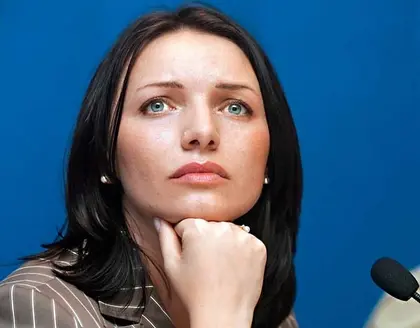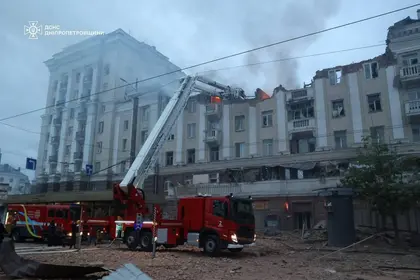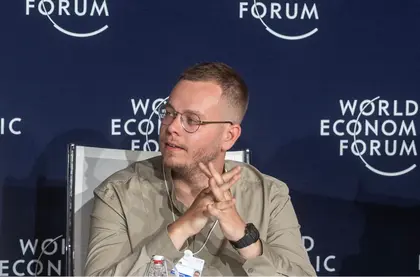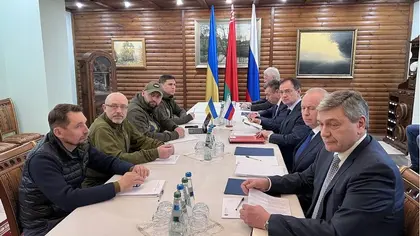The Ukrainian government is receiving international criticism for curtailing democratic freedoms, raising fears that the country is sliding back toward the authoritarian style of rule that flourished under former President Leonid Kuchma.
In 2001, Myroslava Gongadze, the widow of murdered journalist Georgiy Gongadze, received political asylum in the United States. She had plenty of reasons to leave Ukraine – the murder of her husband on Sept. 16, 2000, allegations that Kuchma and other high-level officials were involved, and an investigation that veered from farce to cover-up and that is still ongoing 11 years later.
Myroslava Gongadze worried about her personal safety and the safety of her two young daughters, so she fled to America. Since then, she’s established herself as a successful journalist and TV host at the Voice of America, as well as a public speaker and human rights activist.
The Kyiv Post spoke with Gongadze about the West’s reaction to declining democracy in Ukraine, the parallels between Ukraine now and the Ukraine of Kuchma from 1994 to 2005 and the feelings of a political asylum seeker.
Kyiv Post: On Jan. 13, Freedom House published a report saying that Ukraine had lost its democratic achievements. Does it mean that the West has finally officially recognized the decline of democratic freedoms and civil liberties in Ukraine?
Myroslava Gongadze: The West is totally aware of the usurpation of power by a certain political group that is pursuing its own financial interests. The thing is that the Western governments have already gotten used to the Ukrainian elite’s political manipulations and, frankly speaking, have no desire to interfere in that process. Of course, the West would like to have Ukraine develop as a democratic state, but neither Washington nor Brussels is going to do the job for Ukrainians.
The West respects the people’s will in electing Yanukovych. But the recent reports on the situation in Ukraine, critical comments from Western experts and even state officials imply that the Ukrainian government went too far. Given the situation in authoritarian Russia and Belarus, the West is feeling that it’s losing its last hope for democracy and pluralism in Ukraine, which soon might lead to very sad consequences. The repressions and prosecutions are becoming a bad disease in Ukraine, an abscess that will burst if not treated.
KP: The Czech Republic has recently granted political asylum to former Economy Minister Bohdan Danylyshyn. Does this case indicate that the new administration is cracking down on its political opponents?
MG: I am sure that this “selective justice” that Ukrainian law enforcement authorities are practicing now was one of the factors that made the Czechs to grant Danylyshyn asylum. Let’s be realistic. Ukrainian politicians are not angels. But again, if somebody committed a crime and has to be punished for that, the only right way to do it is to conduct an unbiased investigation and respect the rule of law.
However, the current actions of the prosecutor’s office look like unprecedented abuse of power for the sake of political order. But Ukraine is not Russia, as [Kuchma] said.
The Internet has broken down informational frontiers, thus authoritarian rule has no chance to take hold in Ukraine. Sooner or later a critical number of new [politicians] will blow away the current ones, and they will face criminal charges themselves. So they should do everything possible in order not to find themselves in the current opposition’s shoes. And the only way to avoid it is to respect the law.
KP: Do you see any parallels between Ukraine now and Ukraine of 2000?
MG: There are a lot of parallels, but I have a feeling that the new authorities can and will be even more brutal than Kuchma’s regime. That’s why it’s so dangerous. They are trying to persuade society that they won’t let up any time soon.
Was it possible to prevent all these events that are now taking place – raiding of businesses, arrests of opposition leaders, crackdown on human rights activists and political opponents? Yes, but the leaders of the Orange Revolution who pledged to put bandits in jail failed to fulfill their promise and establish the rule of law. Had they done so we would have had a totally different Ukraine. These people should blame themselves first of all.
KP: From your personal experience – what did you feel when you were asking for political asylum in America?
MG: Loss of my motherland, home, comfort, everything that matters. Not being able to come home was just killing me. I had to explain all my fears and dangers, prove the facts of persecution. This is a very humiliating procedure. It’s like a death to some degree, the end of the life you had before. But at the same time this is a beginning of a new life if you are strong enough to move on.
KP: A court will soon start hearing the case of Oleksiy Pukach’s involvement in your husband’s murder. You and your lawyer, Valentyna Telychenko, are trying to contest the elimination of the paragraph that said that Pukach was acting upon an order. What are you going to do if your complaint is not satisfied?
MG: We hope that the Prosecutor General’s Office will cancel its previous decision. If not, we have enough arguments for the court.
KP: And one theoretical question: What circumstances will push the current authorities to pursue the people who ordered the murder?
MG: The price of this question is too high. I am trying to crack this chess game. I would just add that the future of Ukraine depends on the person who wins it.
Kyiv Post staff writer Olesia Oleshko can be reached at [email protected]
You can also highlight the text and press Ctrl + Enter







Comments (0)